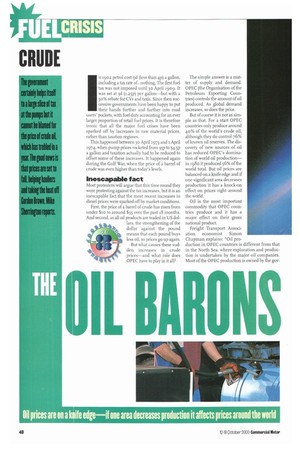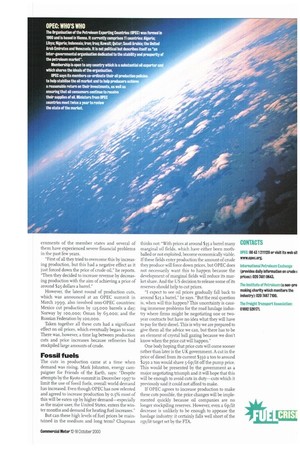1 n 1902 petrol cost gd (less than 4p) a gallon,
Page 42

Page 43

If you've noticed an error in this article please click here to report it so we can fix it.
including a tax rate of...nothing. The first fuel tax was not imposed until 3o April igog. It was set at 3d (1.25p) per gallon—but with a 50% rebate for CVs and taxis. Since then suc cessive governments have been happy to put
1 n 1902 petrol cost gd (less than 4p) a gallon,
including a tax rate of...nothing. The first fuel tax was not imposed until 3o April igog. It was set at 3d (1.25p) per gallon—but with a 50% rebate for CVs and taxis. Since then suc cessive governments have been happy to put their hands further and further into road users' pockets, with fuel duty accounting for an ever larger proportion of retail fuel prices. It is therefore ironic that all the major fuel crises have been sparked off by increases in raw material prices, rather than taxation regimes.
This happened between 30 April 1973 and i April 1974, when pump prices rocketed from 35p to 54.5p a gallon and taxation actually had to be reduced to offset some of these increases, It happened again during the Gulf War, when the price of a barrel of crude was even higher than today's levels.
Inescapable fact
Most protesters will argue that this time round they were protesting against the tax increases, but it is an inescapable fact that the most recent increases in diesel prices were sparked off by market conditions.
First, the price of a barrel of crude has risen from under $io to around $35 over the past 18 months.
And second, as all oil products are traded in US dollars, the strengthening of the dollar against the pound means that each pound buys less oil, so prices go up again.
But what causes these sudden increases in crude prices—and what role does OPEC have to play in it all?
The simple answer is a matter of supply and demand. OPEC (the Organisation of the Petroleum Exporting Countries) controls the amount of oil produced. As global demand increases, so does the price.
But of course it is not as simple as that. For a start OPEC countries only produce around 40% of the world's crude oil, although they do control 76% of known oil reserves. The discovery of new sources of oil has reduced OPEC's domination of world oil production— in 1980 it produced 56% of the world total. But oil prices are balanced on a knife edge and if one significant area decreases production it has a knock-on effect on prices right around the world.
Oil is the most important commodity that OPEC countries produce and it has a major effect on their gross national product.
Freight Transport Association economist Simon Chapman explains: "Oil pro duction in OPEC countries is different from that in the North Sea, where exploration and production is undertaken by the major oil companies. Most of the OPEC production is owned by the gov ernments of the member states and several of them have experienced severe financial problems in the past few years.
"First of all they tried to overcome this by increasing production, but this had a negative effect as it just forced down the price of crude oil," he reports. "Then they decided to increase revenue by decreasing production with the aim of achieving a price of around Sz5 dollars a barrel."
However, the latest round of production cuts, which was announced at an OPEC summit in March 1999, also involved non-OPEC countries: Mexico cut production by 125,000 barrels a day; Norway by 100,000; Oman by 63,000; and the Russian Federation by too,000.
Taken together all these cuts had a significant effect on oil prices, which eventually began to soar. There was, however, a time lag between production cuts and price increases because refineries had stockpiled large amounts of crude.
roman fuels
The cuts in production came at a time when demand was rising. Mark Johnston, energy campaigner for Friends of the Earth, says: "Despite attempts by the Kyoto summit in December 1997 to limit the use of fossil fuels, overall world demand has increased. Even though OPEC has now relented and agreed to increase production by 0.5% most of this will be eaten up by higher demand—especially as the major user, the United States, enters the winter months and demand for heating fuel increases."
But can these high levels of fuel prices be maintained in the medium and long term? Chapman thinks not: "With prices at around $35 a barrel many marginal oil fields, which have either been mothballed or not exploited, become economically viable. If these fields enter production the amount of crude they produce will force down prices, but OPEC does not necessarily want this to happen because the development of marginal fields will reduce its market share. And the US decision to release some of its reserves should help to cut prices.
"I expect to see oil prices gradually fall back to around $25 a barrel," he says. "But the real question is, when will this happen? This uncertainty is causing immense problems for the road haulage industry where firms might be negotiating one or twoyear contracts but have no idea what they will have to pay for their diesel. This is why we are prepared to give them all the advice we can, but there has to be an element of crystal ball gazing because we don't know when the price cut will happen."
One body hoping that price cuts will come sooner rather than later is the UK government. A cut in the price of diesel from its current $350 a ton to around Sz5o a ton would shave 5-6p/lit off the pump price. This would be presented by the government as a major negotiating triumph and it will hope that this will be enough to avoid cuts in duty—cuts which it previously said it could not afford to make.
If OPEC agrees to increase production to make these cuts possible, the price changes will be implemented quickly because oil companies are no longer stockpiling reserves. However, even a 6p/lit decrease is unlikely to be enough to appease the haulage industry: it certainly falls well short of the isp/lit target set by the VITA.












































































































